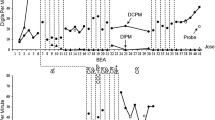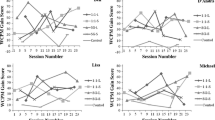Abstract
This study examined the impact of three levels of treatment integrity on students' responding on mathematics tasks. Instruction was provided separately for addition and subtraction to six second-grade students who were referred due to poor performance with these operations. The treatment consisted of a computer delivered delayed prompt to use a counting strategy to solve problems, accuracy feedback, and intermittent presentation of animated praise sequences. Instruction was presented via computerized instruction to assure precise delivery of the varying levels of treatment integrity. The study examined the delivery of prompts for all, two-thirds, and one-third of instructional trials. Continuous delivery of instructional prompts was the most effective treatment or one of the most effective treatments for all participants. Lesser levels of prompt implementation were associated with poorer outcomes for the majority of the students. The implications of these findings for continuing research regarding the impact of reduced treatment integrity on student outcomes are discussed.
Similar content being viewed by others
REFERENCES
Arco, L., & Birnbrauer, J. S. (1990). Performance feedback and maintenance of staff behavior in residential settings. Behavioral and Residential Settings, 5, 207–217.
Baroody, A. J. (1989). Manipulatives don't come with guarantees. Arithmetic Teacher, 37, 4–5.
Foxx, R. M. (1996). Twenty years of applied behavior analysis in treating the most severe problem behavior: Lessons learned. The Behavior Analyst, 19, 225–236.
Gansle, K. A., & McMahon, C. M. (1997). Component integrity of teacher intervention management behavior using a student self-monitoring treatment: An experimental analysis. Journal of Behavioral Education, 7, 405–419.
Greenwood, C. R., Carta, J. J., & Hall, R. V. (1988). The use of classwide peer tutoring strategies in classroom management and instruction. School Psychology Review, 17, 258–275.
Greenwood, C. R., Terry, B., Arreaga-Mayer, C., & Finney, R. (1992). The classwide peer tutoring program: Implementation factors moderating students' achievement. Journal of Applied Behavior Analysis, 25, 101–116.
Gresham, F. M. (1989). Assessment of treatment integrity in school consultation and prereferral intervention. School Psychology Review, 18, 37–50.
Gresham, F. M., Gansle, K. A., Noell, G. H., Cohen, S. & Rosenblum, S. (1993). Treatment integrity of school-based behavioral intervention studies: 1980–1990. School Psychology Review, 22, 254–272.
Groen, G., & Resnick, L. B. (1977). Can preschool children invent addition algorithms? Journal of Educational Psychology, 69, 645–652.
Happe, D. (1982). Behavioral intervention: It doesn't do any good in your briefcase. In J. Grimes, (Ed.), Psychological approaches to problems of children and adolescents (pp. 15–41). Des Moines, IA: Iowa Department of Public Instruction.
Holcombe, A., Wolery, M., & Snyder, E. (1994). Effects of two levels of procedural fidelity with constant time delay on children's learning. Journal of Behavioral Education, 4, 49–73.
Houlihan, D. M., & Ginsburg, H. P. (1981). The addition of methods of first-and second-grade children. Journal for Research in Mathematics Education, 12, 95–106.
Jastak, S. & Wilkinson, G. S. (1984). Wide Range Achievement Test-Revised. Wilmington, DE: Jastak Associates.
Kirk, G. (1982). Design and analysis. Englewood Cliffs, NJ: Prentice-Hall Inc.
Lentz, F. E., & Daly, E. J., III (1996). Is the behavior of academic change agents controlled metaphysically? An analysis of the behavior of those who change behavior. School Psychology Quarterly, 11, 337–352.
Lloyd, J., Saltzman, N. J., & Kauffman, J. M. (1981). Predictable generalization in academic learning as a result of preskills and strategy training. Learning Disability Quarterly, 4, 203–216.
Marston, D. B. (1989). Acurriculum-based measurement approach to assessing academic performance: What it is and why do it. In M. R. Shinn (Ed.), Curriculum-based measurement: Assessing special children (pp. 18–78). New York: Guilford Press.
McEvoy, M. A., Shores, R. E., Wehby, J. H., Johnson, S. M., & Fox, J. J. (1990). Special education teachers' implementation of procedures to promote social interaction among children in integrated settings. Education and Training in Mental Retardation, 25, 267–276.
Mortenson, B. P., & Witt, J. C. (1998). The use of weekly performance feedback to increase teacher implementation of a prereferral academic intervention. School Psychology Review, 27, 613–627.
Noell, G. H., & Gresham, F. M. (2001). A multiple sequence variant of the multiple baseline design: A strategy for analysis of sequence effects and treatment comparison. School Psychology Quarterly, 16, 207–221.
Noell, G. H. & Witt, J. C. (1999). When does consultation lead to intervention implementation? Critical issues for research and practice. Journal of Special Education, 33, 29–35.
Noell, G. H., Witt, J. C., Gilbertson, D. N., Ranier, D. D., & Freeland, J. T. (1997). Increasing teacher intervention implementation in general education settings through consultation and performance feedback. School Psychology Quarterly, 12, 77–88.
Noell, G. H., Witt, J. C., LaFleur, L. H., Mortenson, B. P., Ranier, D. D., & LeVelle, J. (2000). A comparison of two follow-up strategies to increase teacher intervention implementation in general education following consultation. Journal of Applied Behavior Analysis, 33, 271–284.
Peck, C. A., Killen, C. C., & Baumgart, D. (1989). Increasing implementation of special education instruction in mainstream preschools: Direct and generalized effects of nondirective consultation. Journal of Applied Behavior Analysis, 22, 197–210.
Peterson, L., Homer, A., & Wonderlich, S. (1982). The integrity of independent variables in behavior analysis. Journal of Applied Behavior Analysis, 15, 477–492.
Roberts, R. N., Nelson, R. O., & Olson, T. W. (1987). Self-instruction: An Analysis of the differential effects of instruction and reinforcement. Journal of Applied Behavior Analysis, 20, 235–242.
Shinn, M. R. (1989). Curriculum-based measurement: Assessing special children. New York: Guilford.
Vermilyea, B. B., Barlow, D. H., & O'Brien, G. T. (1984). The importance of assessing treatment integrity: An example in the anxiety disorders. Journal of Behavioral Assessment, 6, 1–11.
White, G. D., Nielsen, G., and Johnson, S. M. (1972). Timeout duration and the suppression of deviant behavior in children. Journal of Applied Behavior Analysis, 5 111–120.
Yeaton, W. H., & Sechrest, L. (1981). Critical dimensions in the choice and maintenance of successful treatments: Strength, integrity, and effectiveness. Journal of Consulting and Clinical Psychology, 49, 156–167.
Author information
Authors and Affiliations
Rights and permissions
About this article
Cite this article
Noell, G.H., Gresham, F.M. & Gansle, K.A. Does Treatment Integrity Matter? A Preliminary Investigation of Instructional Implementation and Mathematics Performance. Journal of Behavioral Education 11, 51–67 (2002). https://doi.org/10.1023/A:1014385321849
Issue Date:
DOI: https://doi.org/10.1023/A:1014385321849




